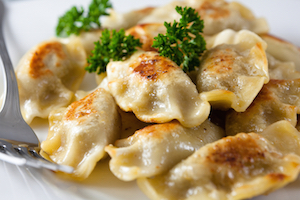Brown, L. and Paszkiewicz , I. 2017 The role of food in the Polish migrant adjustment journey Appetite Volume 109, 1 February 2017, Pages 57–65
http://dx.doi.org/10.1016/j.appet.2016.11.024
In 2015, there were 916,000 Poles living in the UK, making them the largest group of non-UK nationals at 16.5 percent of the population. Though increasingly research has focused on the consequences of this migration for both migrants themselves and the receiving country, little research has looked at food habits. This paper will explore the role of food in the Polish migrant adjustment journey. A qualitative approach was adopted, involving semi-structured interviews with nine Polish migrants.
In this study, Polish migrants described the move to a new culture as a time of stress and loneliness. Due to a lack of money, they were forced to eat local food, which exacerbated their unease, as they found it to be tasteless and unhealthy. As soon as their financial situation improved, they reverted to a Polish diet, relying on ingredients brought from home, from London, or more recently, purchased from local Polish shops. This gave them comfort, and all participants acknowledged the vital role of food in their adjustment to life in a new culture.
Introduction
On May 1 2004, Poland joined the European Union together with seven other eastern European countries. The 2004 UK census recorded 69,000 Poles, which rose to 916,000 in 2015, making the Poles the largest group of non-UK nationals at 16,5 percent (Annual Population Survey, ONS, 2015), and constituting one of the largest migration movements in contemporary Europe. Records for the Accession Monitoring Report (Home Office, 2009) show that between 1 May 2004 and 31 March 2009, the highest proportion of approved applicants to the UK Workers Registration Scheme was from Poland (66% of the total 965,000), which means that over half a million Polish migrants registered to work in the United Kingdom. The Statistical Bulletin issued by the Department for Work and Pensions (2015) shows that in 2014 the total number of National Insurance Number registrations was 768,000, an increase of 23% on 2013. According to the Migration Observatory (MO, 2016), the Polish-born population in the UK is widely spread across the UK, although London accommodates over 390,150 Polish-born residents (4.59% of London’s population). The Midlands meanwhile is noted for hosting many industries that provide employment to about 102,473 Polish migrants, while Scotland accommodates 75,231 Poles (MO, 2015). Polish migrants to the UK are aged mainly between 20 and 24; this contrasts with the older cohorts aged 25-29 and 30-34, who tend to go to the Western European countries such as Germany (Department for Work and Pensions, 2015).
Research on Polish migrants has grown significantly over the last few years, covering a variety of topics related to the way Poles have negotiated their lives following transition to the UK. Research has focused on the social interaction patterns of Polish migrants, with Garapich (2007) and Ryan (2010) exploring social networks, and Ryan et al. (2008) and White and Ryan (2008) examining links between the origin and host country. The structure of the Polish community in the UK has been investigated by numerous authors (Brown, 2003; Spencer et al., 2007; Garapich 2007; White & Ryan, 2008; Temple and Koterba 2009). Meanwhile Rabikowska (2010) has considered the importance of traditional food to migrants, whilst Rabikowska and Burrell (2009) have explored the proliferation of Polish shops in British cities. Identity issues have been the subject of research (Kosic 2006; Eade et al. 2006; Kempny 2010; Egger 2011), related to which are studies of church attendance (Burrell, 2006), economic income and status (Eade and Grapich 2007; Bobek & Salamonska, 2008; Nowicka 2012), and language difficulties (Janta et al., 2012; Lyon & Sulcova, 2009). Finally, the extent of Polish migrant integration with the host community and other ethnic groups has been the subject of research attention (Burrell 2009; Datta and Brickell 2009; Ryan 2010; Nowicka 2012; Nowicka 2014).
This paper will explore the role of food in the Polish migrant adjustment journey. A literature search shows that there is a gap in knowledge on the role of food in the Polish migration experience. As Locher et al. (2005) point out, food and emotions are interlinked, therefore it is to be expected that it will occupy an important role in the migrant adjustment process.
